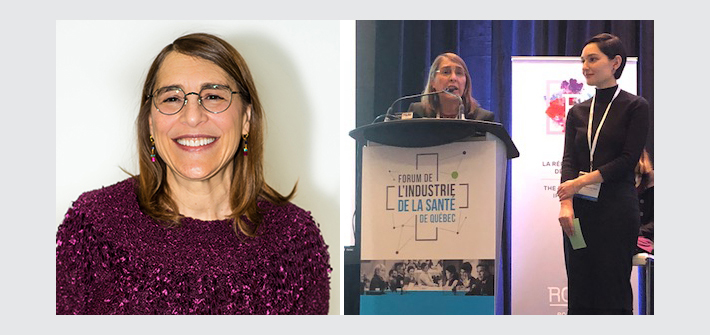
Breadcrumb
- News and Events
- News
- Content
- RI-MUHC ANNUAL REPORT 2018: Business development activities
null RI-MUHC ANNUAL REPORT 2018: Business development activities
Bringing an innovative retinal gene therapy to clinic
Imagine a world devoid of colour, a world where the smile of a loved one is indistinguishable from a black abyss. This world is the everyday reality for people suffering from Zellweger spectrum disorder (ZSD). Affecting around 2,000 people worldwide, most of them children, ZSD is a rare genetic disease driven by a mutation that causes degeneration in the retina of the eye. A cure for the resulting vision loss previously seemed impossible. However, thanks to an innovative research team led by Dr. Nancy Braverman (Child Health and Human Development Program; Centre for Translational Biology), that cure is potentially in sight.
Dr. Braverman, a medical geneticist, assembled a team of scientists and clinicians from the Université de Montréal, Johns Hopkins University, the University of Pennsylvania and the University of Southern California. Each of their contributions, ranging from a mouse model of ZSD to expertise in retinal gene correction delivery systems, proved crucial to completing the puzzle: a retinal gene therapy capable of correcting the most common mutation that causes ZSD. Dr. Braverman’s own laboratory demonstrated that correcting this mutation in a mouse model both slowed and reversed vision loss.
With these groundbreaking findings, Dr. Braverman approached Costas Karatzas, PhD, of the Business Development and Contracts Office at the RI-MUHC, who worked with the team to build partnerships and secure financing. Ultimately, the goal is to bring this new therapy to the clinic—and a new outlook on life to patients living with ZSD.
AmorChem, a group that provides expertise and venture capital for academic projects, is backing the initial funding of the program. “The collaborative nature of this project has created the ideal ‘ecosystem’ for discovery science to be de-risked,” says Costas Karatzas, “and to be translated into clinical reality through a well-designed development path.”

Learn more about Dr. Braverman’s research on peroxisomal disorders:
The Longitudinal Natural History Study of Patients with Peroxisomal Biogenesis Disorders
Role of peroxisomes in innate immune responses (Science Daily)
Research on Rhizomelic Chondrodysplasia Punctata (RCDP) (The New York Times)
Caring for a child with a degenerative rare disease (MUHC)
Champion of the 2017 AmorChem KNOCK OUT event: Team Braverman! (RI-MUHC)
